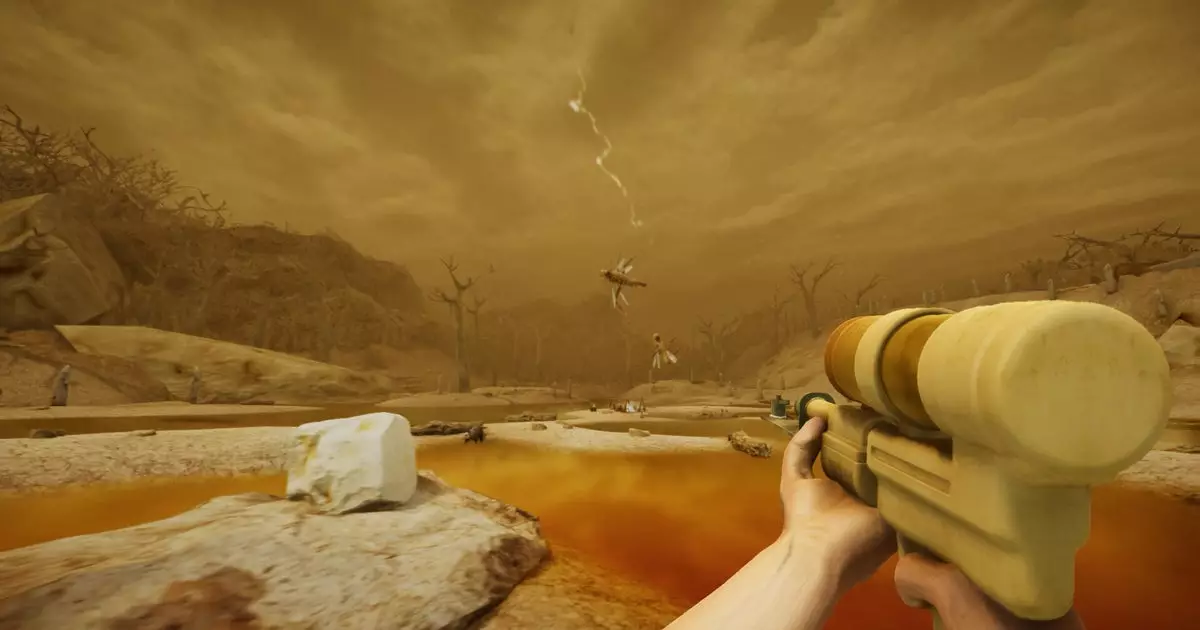The world of video games has a long history of pushing boundaries, but few ideas are as bizarre and experimental as the concept behind Urge, an open-world survival shooter that brings an unconventional element to the forefront: bodily fluids, specifically urine. While this concept may elicit immediate repulsion, a deeper exploration reveals a well-conceived, albeit eccentric, game that challenges traditional norms and expectations in the gaming industry.
It’s hard not to react skeptically when first hearing about a game that revolves around urine as a central theme. The initial thought might be that this is merely a gimmick intended to attract attention through shock value. However, as one digs deeper, it becomes clear that Urge is not simply a tongue-in-cheek jab at the taboo; instead, it uses this unusual theme to create a nuanced gaming experience that invites reflection. Launched in early access in 2021, Urge combines imaginative gameplay with profound commentary on survival and environmental dynamics.
The game begins when the player emerges from the wreckage of a car crash, setting the stage for a quest through a peculiar world enveloped in an unsettling fog. This is no fog of mystery or suspense, but rather an atmospheric representation of the game’s underlying mechanic: a manifestation of urine. The environments are saturated with “wee smoke,” which is integral to gameplay mechanics and narrative development. Engaging with this surreal landscape invites players to confront their preconceptions about bodily waste and its implications in a survival scenario.
Urge’s design introduces an intricate relationship between urine and survival, a concept not often explored in video games. Tricks like evaporative geysers, monstrous mutants driven mad by addiction, and even the creative idea of urine transforming into powdered form all emerge throughout the gameplay. The clever representation of the diverse flora and fauna in Urge brings the concept of waste management to the forefront, crafting a unique balance between survival needs and environmental considerations. Players are constantly assessing their surroundings and strategizing about how to handle their character’s bodily functions effectively.
One intriguing gameplay element is the necessity of proper waste disposal. Failing to relieve oneself appropriately—by urinating on the ground instead of finding a toilet—contributes to an increase in the fog that blankets the world. This mechanic cleverly correlates the player’s decisions with the consequences for their environment. This relationship creates a feedback loop: the more carelessly one manages their character’s bodily needs, the more challenging the adversaries become, reinforcing the theme that neglect can escalate environmental issues.
While the game’s absurd premise may initially seem immature or trivial, it resonates on a more profound level concerning contemporary issues, particularly climate change. Players find themselves navigating a world that mirrors the delicate balance our planet requires in terms of resource management and ecological conservation. Much like the dilemma faced in today’s environment, careless actions in Urge lead to dire consequences—an unexpected but fitting representation of real-world concerns.
Moreover, the game’s take on urine as a renewable resource—utilized to power abandoned vehicles and affect the landscape—re-imagines waste as a source of potential rather than just a problem. This novel approach invites players to think critically about sustainability in moderate ways. For instance, the strategic use of urine becomes integral in crafting and resource management, mirroring how we must blend innovation with prudence in addressing environmental challenges.
Despite initial reluctance from potential players—who may consider the theme distasteful or juvenile—Urge’s ability to provoke thought and discussion indicates its strength as a piece of entertainment. Its early access status allows for community input, ensuring that player experiences continue to shape and refine the game as it evolves. The developers’ cautious handling of the game’s tone and themes, especially on platforms such as Steam, highlights the balance they wish to achieve between engagement and offense.
Overall, while Urge might seem like a quirky experiment on the surface, its intricate gameplay mechanics and deeper implications merit recognition. The game leverages the absurdity of its premise to challenge traditional narratives within the gaming community, transforming bodily waste into a metaphor for sustainable practices and responsibility. As gaming continues to evolve, we can anticipate that titles like Urge will push further into unconventional territory, encouraging players to reflect on both their actions in-game and the real world.


Leave a Reply